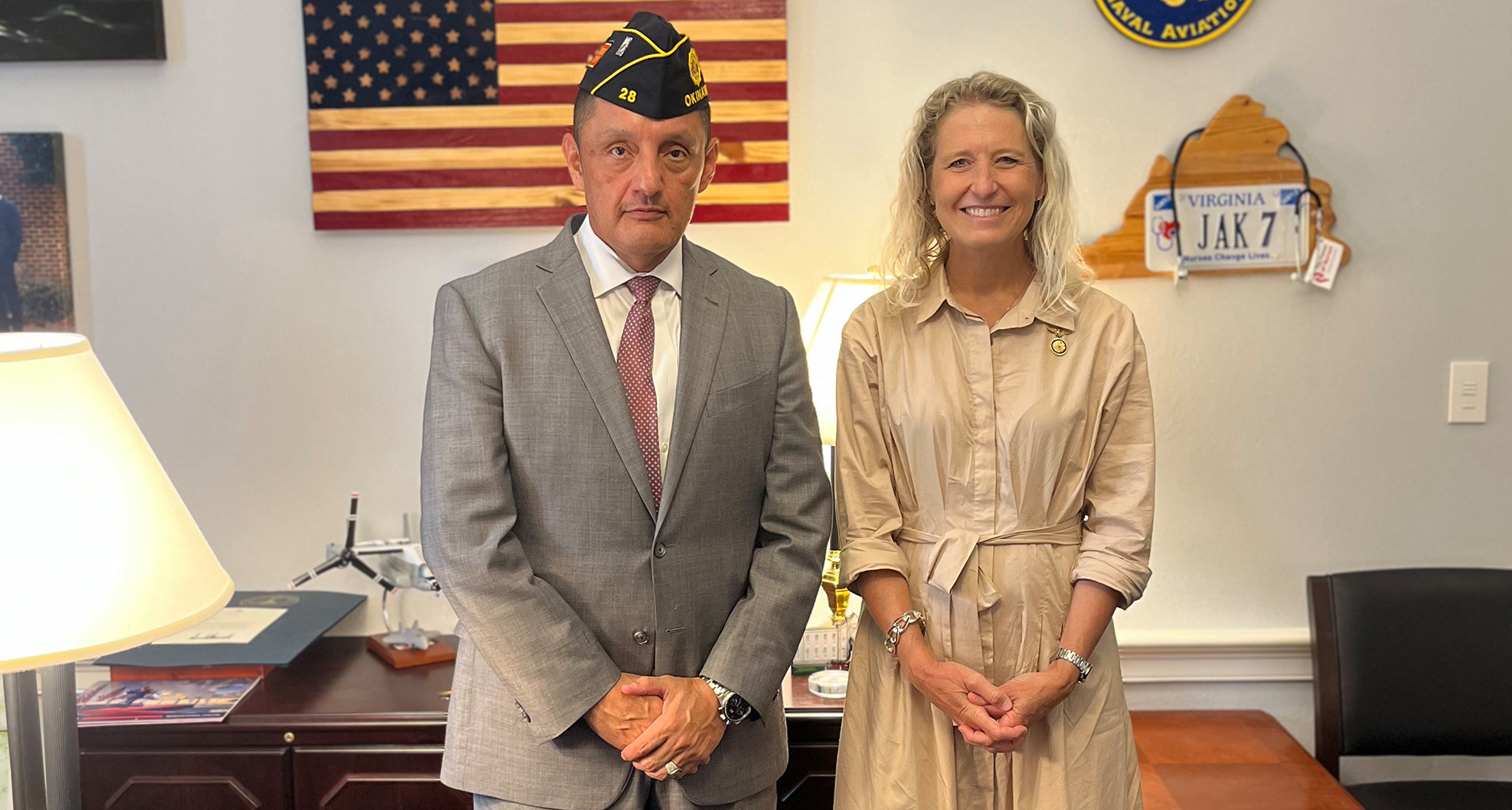
American Legion executive director personally thanks key representative who has championed legislation supported by the organization.
American Legion Executive Director Mario Marquez recently extended the organization’s gratitude personally to Rep. Jen Kiggans, R-Va., who received The American Legion’s Distinguished Public Service Award at the Washington Conference in February.
"The American Legion sincerely thanks Rep. Jen Kiggans for her tireless advocacy on behalf of veterans, servicemembers and military families,” said Marquez, who leads the Legion’s Government Affairs office in D.C. “In recognition of her legislative efforts supporting these communities, Rep. Kiggans was a clear choice for the Legion’s Distinguished Public Service Award. The American Legion looks forward to continuing its work with Rep. Kiggans to support the needs of veterans and servicemembers."
Kiggans, a former Navy helicopter pilot, expressed her thanks to the Legion.
“As a Navy veteran, it’s the greatest honor of my life to continue serving those who have worn the uniform,” she said. “I’m deeply grateful to The American Legion for this recognition and proud to work alongside them to ensure our veterans, servicemembers and military families receive the care, opportunity and respect they deserve. Whether it’s expanding access to VA benefits, strengthening our defense workforce, or investing in critical research for military aviators, I’ll always fight to deliver results for those who’ve sacrificed so much for our country.”
Among Legion-supported legislation that Kiggans has introduced:
• H.R. 3107 Securing the Rights our Veterans Earned (SERVE) Act: The SERVE Act would automatically make veterans who received an Other-Than-Honorable or Entry-Level Separation discharge eligible for VA benefits, so long as their discharge was solely due to their gender identity or sexual orientation. The American Legion is one of few veterans service organizations that provides a Discharge Upgrade Program to assist veterans with “bad paper” discharges. Its support for the bill is justified by Resolution No. 10: Care for the Lesbian, Gay, Bisexual, Transgender, Queer, + Veteran Community.
Title 10, United States Code, sections 1552 and 1553, provides statutory authority for the existence and operation of the Military Discharge Review Boards and the Boards for Correction of Military Records. The American Legion was instrumental in the creation of these boards shortly after World War II and has since represented veterans who petition them for relief.
• H.R. 3241 Defense Workforce Integration Act: This bill creates new pathways for medically disqualified military applicants to serve in national defense through civilian careers. It directs the Department of Defense to connect these individuals, including entry-level recruits, with employment, training and apprenticeship opportunities across the defense industrial base and other critical sectors.
The American Legion’s Resolution No. 48: Rebuilding the U.S. Defense Industrial Base aligns closely with the Defense Workforce Integration Act. Both see the critical need to modernize the defense industrial base by giving the opportunity for veterans to serve in non-military roles critical to defense readiness and economic resilience to strengthen the United States’ national security.
Looking ahead, there are two other bills that have not been introduced but the Legion is working with Kiggans on:
• The WINGS Act, which directs the Secretary of Defense to conduct a study on the long-term physiological and psychological effects of military aviation on members of the armed forces who serve as aviators, and for other purposes. The legislation mandates the Department of Defense and Department of Veterans Affairs to allocate research funding toward studying the neurological effects of G-forces and blast exposures. It aims to enhance surveillance, prevention, diagnostic and treatment protocols. The bill establishes standardized data collection methods for tracking exposure through technologies such as wearable devices and blast sensors. It also expands access to clinical care, including traumatic brain injury and neurological screenings — for active-duty servicemembers, reservists and veterans within VA and DoD.
In May 2025, The American Legion submitted a Statement for the Record emphasizing support for “increased education and research into this emerging issue,” regarding traumatic brain injuries and neurological issues associated with military service.
• The Fluent Forces Act seeks to address the absence of an annual report on retention and recruitment to record the retention rate and recruiting practices of DoD’s Defense Language Institute Foreign Language Center for the development of specialized training for active-duty personnel trained in linguistic and cultural expertise. The bill improves the armed forces' intelligence capabilities through enhanced high-value language proficiency. This proficiency is crucial for achieving successful foreign policy and national security, encompassing counterinsurgency, counterterrorism, and great power competition. To further enhance the military's foreign language capabilities, the bill establishes reporting parameters for enlistment and requirements, and mandates reports to the Senate and House oversight committees.
The Legion has approved Resolution No. 30: Modernization of the Armed Forces, which supports efforts to modernize military capabilities, maintaining a strategic advantage in their overall use. The American Legion advocates for Congress-led initiatives to ensure the readiness and preparedness of our armed forces' combat capabilities and provide readiness support to our active-duty servicemembers on all fronts, thereby maintaining a competitive advantage over our adversaries.
- Legislative

